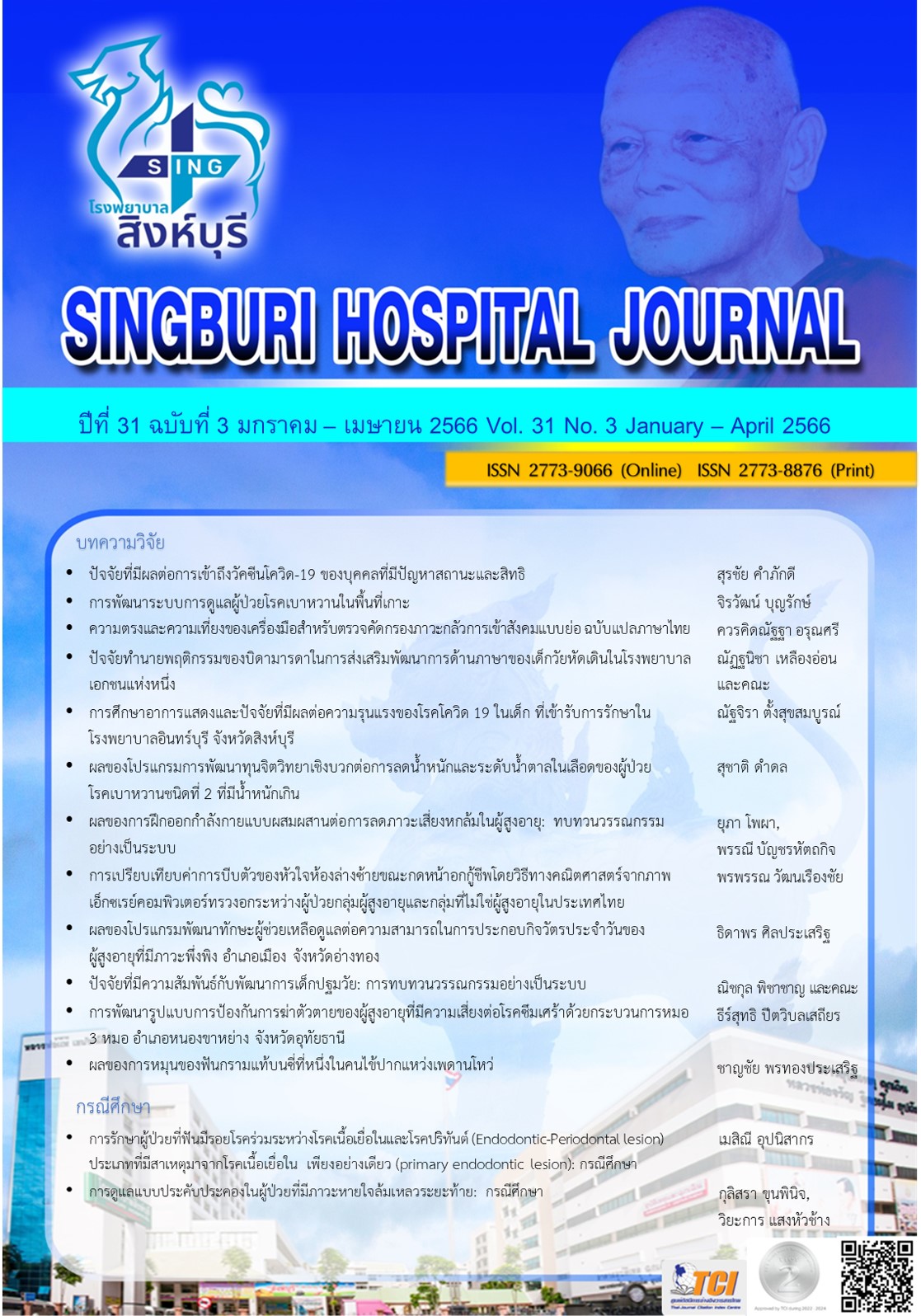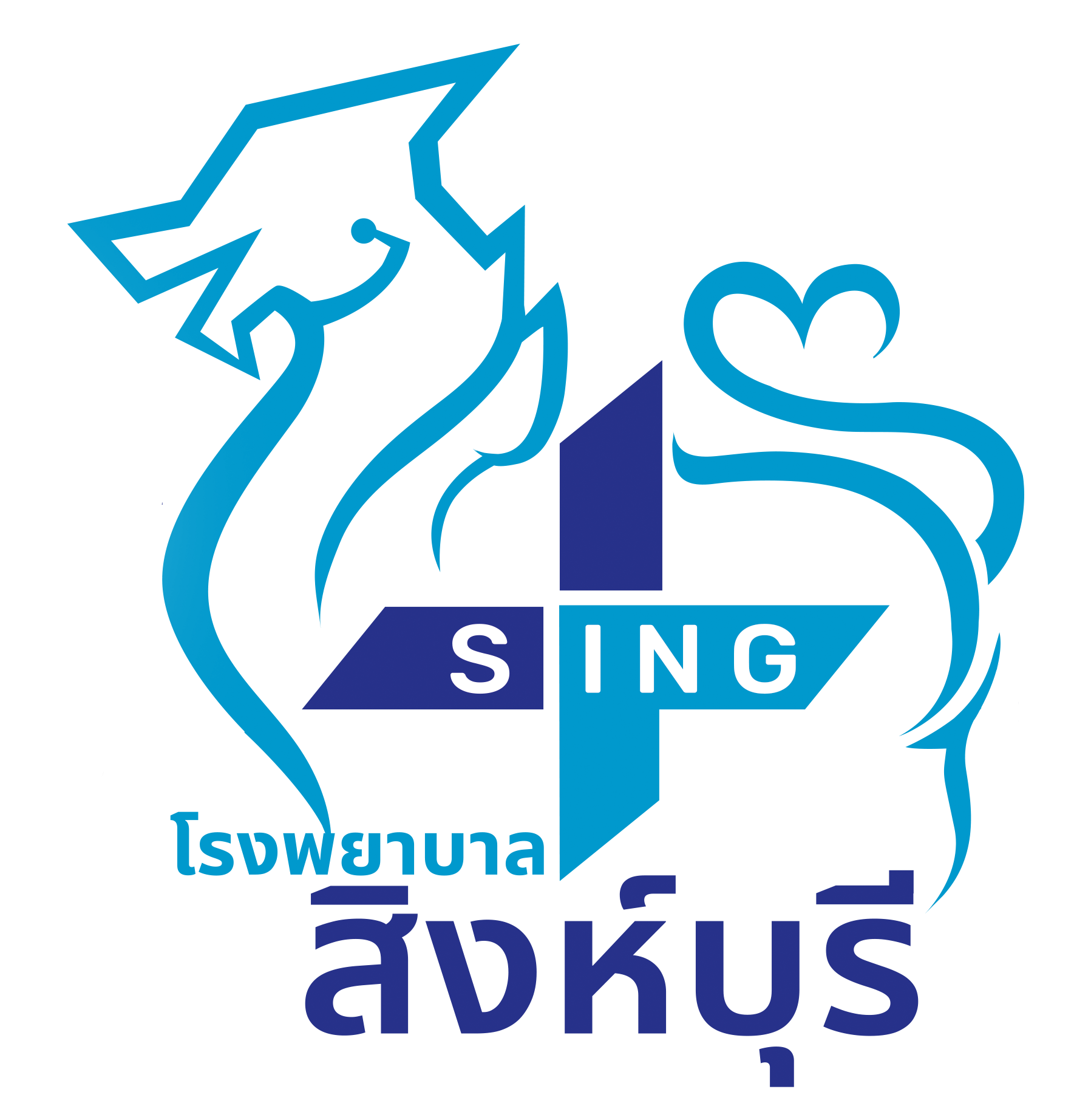การรักษาผู้ป่วยที่ฟันมีรอยโรคร่วมระหว่างโรคเนื้อเยื่อในและโรคปริทันต์ (Endodontic-Periodontal lesion) ประเภทที่มีสาเหตุมาจากโรคเนื้อเยื่อใน เพียงอย่างเดียว (primary endodontic lesion): กรณีศึกษา
คำสำคัญ:
รอยโรคร่วมระหว่างโรคเนื้อเยื่อในและโรคปริทันต์, รอยโรคร่วมประเภทที่มีสาเหตุมาจากโรคเนื้อเยื่อในเพียงอย่างเดียว, การรักษาคลองรากฟันบทคัดย่อ
รอยโรคเนื้อเยื่อในและรอยโรคปริทันต์ ต่างมีสาเหตุของการเกิดโรคที่ต่างกัน แต่รอยโรคทั้งสองอาจมีความสัมพันธ์กัน กล่าวคือ การเกิดโรคใดโรคหนึ่งอาจส่งผลต่อการดำเนินโรค การวางแผนการรักษา และการพยากรณ์การรักษาของอีกโรคได้ การวินิจฉัยหาสาเหตุของรอยโรคหรือวินิจฉัยว่ารอยโรคทั้งสองนั้นอาจมีความสัมพันธ์กัน จำเป็นต้องมีความรู้ถึงช่องทางติดต่อของเนื้อเยื่อในและเนื้อเยื่อปริทันต์ ผลของพยาธิสภาพของเนื้อเยื่อในและเนื้อเยื่อปริทันต์ที่มีต่อกัน รวมทั้งประเภทของรอยโรคร่วมระหว่างโรคเนื้อเยื่อในและโรคปริทันต์ ซึ่งจะเป็นแนวทางในการวินิจฉัยแยกโรค การพยากรณ์โรค การวางแผนการรักษาอย่างเป็นขั้นตอน และนำมาซึ่งผลสำเร็จในการรักษา
วัตถุประสงค์ เพื่อทบทวนและนำเสนอการรักษาผู้ป่วยที่ฟันมีรอยโรคร่วมระหว่างโรคเนื้อเยื่อในและโรคปริทันต์ประเภทที่มีสาเหตุมาจากโรคเนื้อเยื่อในเพียงอย่างเดียว
กรณีศึกษา ผู้ป่วยหญิงไทยอายุ 42 ปี พบฟันซี่ 46 ได้รับการวินิจฉัยว่ามีรอยโรคร่วมประเภทที่มีสาเหตุจากโรคเนื้อเยื่อในเพียงอย่างเดียว ได้รับการรักษาคลองรากฟันในซี่ที่มีก้อนนิ่วในฟันและมีการตีบตันของคลองรากฟันบางส่วนในรากใกล้กลาง และติดตามผลการรักษาที่ระยะเวลา 6 เดือน พบฟันซี่ 46 ไม่มีอาการใดๆ ตัวฟันอยู่ในสภาพปกติ เหงือกและร่องลึกปริทันต์อยู่ในระดับปกติ ภาพถ่ายรังสีแสดงให้เห็นถึงรอยโรคบริเวณปลายรากฟันและบริเวณง่ามรากฟันมีขนาดเล็กลง
บทสรุป การรักษาฟันที่มีรอยโรคร่วมระหว่างโรคเนื้อเยื่อในและโรคปริทันต์ จำเป็นต้องได้รับการตรวจวินิจฉัยถึงสาเหตุที่แท้จริงของรอยโรค การวางแผนการรักษาที่ถูกต้องอย่างเป็นขั้นตอนตามลำดับ การประเมินการพยากรณ์โรค รวมทั้งการพิจารณาอัตราการคงอยู่ของฟัน อัตราความสำเร็จของการรักษา รวมทั้งความรู้ความเข้าใจเรื่องการหาตำแหน่ง รูเปิดคลองรากฟัน วิธีการสำรวจคลองรากฟัน การใช้เทคนิคในการขยายคลองรากฟันที่เหมาะสมในฟันที่มีการตีบตันของคลองรากฟัน จะช่วยเพิ่มความสำเร็จในการรักษาและลดโอกาสเกิดข้อผิดพลาดขณะทำการรักษาได้
Downloads
เอกสารอ้างอิง
Rotstein I, Simon JH. Diagnosis, prognosis and decision making in the treatment of combined periodontal-endodontic lesions. Periodontol 2000. 2004; 34: 165-203.
Zehnder M, Gold SI, Hasselgren G. Pathologic interactions in pulpal and periodontal tissues. J Clin Periodontol. 2002; 29: 663-71.
Withers JA, Brunsvold MA, Killoy WJ, Rahe AJ. The relationship of palato-gingival grooves to localized periodontal disease. J Periodontol. 1981; 52: 41-4.
Albaricci MF et al. Prevalence and features of palato-radicular grooves: an in-vitro study. J Int Acad Periodontol. 2008; 10: 2-5.
Hou GL, Tsai CC. Relationship between palate-radicular grooves and localized periodontitis. J Clin Periodontol. 1993; 20: 678-82.
Hou GL, Tsai CC. Cervical enamel projection and intermediate bifurcational ridge correlated with molar furcation involvements. J Periodontol. 1997; 68: 687-93.
Al-Shammari KF, Kazor CE, Wang HL. Molar root anatomy and management of furcation defects. J Clin Periodontol. 2001; 28: 730-40.
Tsao YP, Neiva R, Al-Shammari K, Oh TJ, Wang HL. Factors influencing treatment outcomes in mandibular Class II furcation defects. J Periodontal. 2006; 77: 641-6.
Berman LH, Kuttler S. Fracture necrosis: diagnosis, prognosis assessment and treatment recommendations. J Endod 2010; 36(3): 442-46.
Kahler W. The cracked tooth conundrum: terminology, classification, diagnosis, and management. Am J Dent. 2008; 21(5): 275-82.
Yang SE et al. Analysis of the characteristics of cracked teeth and evaluation of pulp status according to periodontal probing depth. BMC Oral Health. 2017; 17(1): 135.
Blieden TM. Tooth-related issues. Ann Periodontol. 1999; 4: 91-7.
Kerns DG, Glickman GN. Endodontic and periodontal interrelationships. In: Hargreaves KM, Berman LH, editors. Cohen’s Pathways of the pulps. 11th Edition. St.Louis, MO: Elsevier Inc; 2016. p. e45-61.
Parolia A, Porto ICM, Gait T, Mala K. Endo-perio lesion: A dilemma from 19th until 21st century. J Interdiscip Dentistry. 2013; 3: 2-11.
Kang MK, Trabert KC, Mehrazarin S. Chapter 46 Endodontic-Periodontic lesions: pathogenesis, diagnosis, and treatment consideration. In: Newman MG, Takei HH, Klokkevold PR, Carranza FA, editors. Newman and Carranza’s Periodontology. 13th Edition. Philadelphia. PA: Elsevier INC.; 2019. P.498-505.e8.
Nirola A, Grover S, Sharma A, Kaur D. Pulpal perio relations: interdisciplinary diagnostic approach- I. J Indian Soc Periodontol. 2011; 15: 80-2.
Sartori S, Silvestri M, Cattaneo V. Endoperiodontal lesion. J Clin Periodontol 2002; 29: 781-3.
Benfica e Silva J et al. Digital subtraction radiography evaluation of the bone repair process of chronic apical periodontitis after root canal treatment. Int Endod J. 2010; 43: 673-80.
Herrera D, Retamal-Valdes B, Alonso B, Feres M. Acute periodontal lesions (periodontal abscesses and necrotizing periodontal disease) and endo-periodontal lesions. J Periodontol. 2018;89(Supp 1): S85-102.
Suelen Cristina Sartoretto et al. Comparing the Long-Term Success Rates of Tooth Preservation and Dental Implants: A Critical Review. J Funct Biomater. 2023; 14, 142: 1-16
Iqbal MK, Kim S. For teeth requiring endodontic treatment, what are the differences in outcomes of restored endodontically treated teeth compared to implant-supported restorations. Int J Oral Maxillofac Implants. 2007; 22(suppl): 96-116.
Moraschini V et al. Evaluation of survival and success rates of dental implants reported in longitudinal studies with a follow-up period at least 10 years: A systematic review. Int J Oral Maxillofac Surg. 2015; 44: 377-88.
Lim JH, Lee JH, Shin SJ. Diagnosis and treatment of teeth with primary endodontic lesions mimicking periodontal disease: three cases with long-term follow ups. Restor Dent Endod. 2014; 39: 56-62.
Krasner P, Rankow HJ. Anatomy of the pulp-chamber floor. Journal of endodontics. 2004; 30(1): 5-16.
Jafarzadeh H, Abbott PV. Ledge formation: review of a great challenge in endodontics. Journal of endodontics. 2007; 33(10): 1155-62.
ดาวน์โหลด
เผยแพร่แล้ว
รูปแบบการอ้างอิง
ฉบับ
ประเภทบทความ
สัญญาอนุญาต
ลิขสิทธิ์ (c) 2023 โรงพยาบาลสิงห์บุรี

อนุญาตภายใต้เงื่อนไข Creative Commons Attribution-NonCommercial-NoDerivatives 4.0 International License.
บทความที่ได้รับการตีพิมพ์เป็นลิขสิทธิ์ของโรงพยาบาลสิงห์บุรี
ข้อความที่ปรากฏในบทความแต่ละเรื่องในวารสารวิชาการเล่มนี้เป็นความคิดเห็นส่วนตัวของผู้เขียนแต่ละท่านไม่เกี่ยวข้องกับโรงพยาบาลสิงห์บุรี และบุคคลากรท่านอื่นๆในโรงพยาบาลฯ แต่อย่างใด ความรับผิดชอบองค์ประกอบทั้งหมดของบทความแต่ละเรื่องเป็นของผู้เขียนแต่ละท่าน หากมีความผิดพลาดใดๆ ผู้เขียนแต่ละท่านจะรับผิดชอบบทความของตนเองแต่ผู้เดียว







